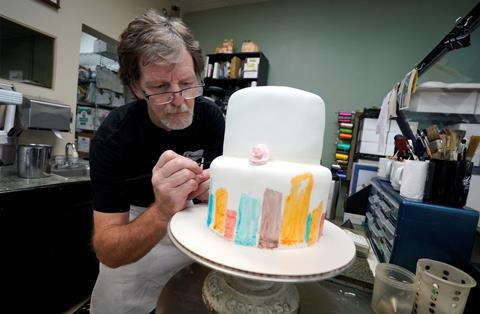The US-based baker Jack Phillips has been heavily criticised for refusing to make cakes which promote LGBT messages. After a lengthy legal battle, the Colorado Supreme Court has thrown the case out. Heather Tomlinson reports

A seven-year battle to defend a Christian baker’s right to refuse making a cake that celebrated transgenderism has ended, with no side able to claim victory.
Why are ‘gay’ cakes in the news again?
Masterpiece Cakeshop owner Jack Phillips has been in a long legal battle with transgender lawyer Autumn Scardina, who had asked Phillips’ small family business to bake a cake to celebrate gender transition in 2017, but been refused. Now, the Colorado Supreme Court has decided it doesn’t have jurisdiction to make this decision and so dismissed the case.
What actually happened?
According to court documents in a previous legal wrangle over this matter, the order was first for a birthday cake: “Scardina ordered a pink cake with blue frosting. She did not request that the cake contain any words, symbols, or details — just a pink cake with blue frosting. Debra [at the bakery] confirmed that Masterpiece could make the requested cake.
“Scardina then told Debra that the custom birthday cake had personal significance, reflecting Scardina’s birthday as well as celebrating her transition from male to female. Debra replied that she did not think the shop could make the cake ‘because of the message’.”
Why would a Christian refuse to make a blue and pink cake if it didn’t have any explicit messages about gender written on it?
According to the court documents, Phillips testified that he “won’t design a cake that promotes something that conflicts with [the] Bible’s teachings” because “he believes that God designed people male and female, that a person’s gender is biologically determined.”
An important legal issue is whether the business would not bake a cake because of the gender identity of the customer – or due to the message of the cake. The court documents say: “Phillips agreed that a pink cake with blue frosting has no ‘particular inherent meaning’ and does not express any message. The trial court found that Phillips would make the same pink and blue cake for other customers and would even sell an identical pre-made (as opposed to custom ordered) cake to Scardina, even if she disclosed the purpose of the cake.”
What laws were alleged to have been broken?
Colorado’s Anti-Discrimination Act outlaws treating people differently due to gender, race or sexual orientation. But the Court’s statement said that it wouldn’t determine the legal issue of how to “balance the rights of transgender individuals to be free from discrimination in places of public accommodation” with the “rights of religious business owners when they are operating in the public market.”
The baker’s name sounds familiar.
Phillips has been in and out of the courts for over 12 years. He had a separate long-running court battle to defend his refusal to make a cake for a gay wedding in 2012. The US Supreme Court ruled in his favour in 2018 amid significant public interest and large rallies of support, reversing a previous decision by the Colorado Civil Rights Commission.
Why wasn’t that the end of it?
On the same day that the Supreme Court announced it would hear the case regarding same-sex marriage cakes, Scardina called the baker to request the “gender transition” cake according to the Christian advocacy group Alliance Defending Freedom (ADF). Later the lawyer requested another cake “featuring Satan smoking marijuana,” ADF said.
Scardina first complained to the Commission who began another prosecution. However this was then thrown out after it counter-sued with evidence of the state’s hostility toward religion, ADF said.
However, Scardina then used another legal avenue to sue Phillips, leading to this Colorado Supreme Court dismissal.
Why did the transgender lawyer want this particular baker to make a cake?
Autumn Scardina has professed Christian faith in the past. An account on X that purports to be Scardina’s (but not confirmed to be so) responded to challenges from the public with Bible quotes and said: “I am very comfortable with relationship with the Holy Spirit” and earlier “I don’t wish to destroy anyone and as a Christian share many of the same religious views as Mr. Phillips. We disagree on whether our religious beliefs should allow us to violate anti-discrimination laws.”
According to the legal firm’s website, Scardina used to work as a litigator and then moved to family law. “Autumn’s passion is helping others,” states the lawyer’s page. “Having recently lived through a period of tremendous personal change, her greatest satisfaction is in seeing others through difficult and emotional challenges and helping them thrive in spite of what can feel like overwhelming circumstance.”
Why would a Christian pursue this case, given the instruction not take another Christian to court in 1 Corinthians 6? And also ask for a cake with Satan on it?
This is unclear. Scardina didn’t respond to an opportunity to comment at the time of going to press.
So what happens now?
Scardina’s attorney, John McHugh, is evaluating if there are any remaining legal options to pursue the case, according to the Associated Press. “The Colorado Supreme Court decided to avoid the merits of this issue by inventing an argument no party raised,” McHugh said, the AP reported.
“Enough is enough,” said ADF Senior Counsel Jake Warner in a statement. “Jack has been dragged through courts for over a decade. It’s time to leave him alone.”
I thought this issue had already been decided by the courts, and that Christians are allowed to refuse to make cakes if they wish, on the grounds of free speech?
You may be thinking of a similar case in the UK where courts initially found in favour of gay activist Gareth Lee when he sued Ashers Bakery in Belfast because they wouldn’t make a cake with the message “support gay marriage” written on it. However in 2018 the UK Supreme Court reversed this decision, and then when Lee took it to the European Court of Human Rights, the justices refused to rule due to a technicality.
Of all things, why have cakes become such a subject of contention between Christians and the outside world?
It’s not just cakes – anyone providing a service could in theory be prosecuted for refusing anything due to the customer’s homosexuality or transgenderism. Perhaps cakes have become a particular issue because they are frequently ordered for weddings or require a slogan or message.
In the UK there was also a legal tussle over the right of a Christian-owned Chymorvah Hotel in Cornwall to refuse to allow two men to sleep in the same double room – a policy they applied to all unmarried couples. Owners Peter and Hazelmary Bull were forced to sell their business and pay thousands in compensation after the courts ruled in favour of the gay couple, with a final decision from the Supreme Court in 2014.
Is this another example of Christians being obsessed with sexuality?
Some will indeed see it that way. But the ADF points out that Phillips refuses to bake any cakes that conflict with his religious beliefs. “Jack gladly creates cakes for people from all backgrounds, but like many other cake artists, he declines custom cake requests promoting messages that conflict with his beliefs, including cakes celebrating Halloween and adult-themed events, those that express an anti-American message, and cakes for same-sex weddings,” ADF said. “He has also declined to create a cake disparaging people who identify as LGBT.”






































No comments yet